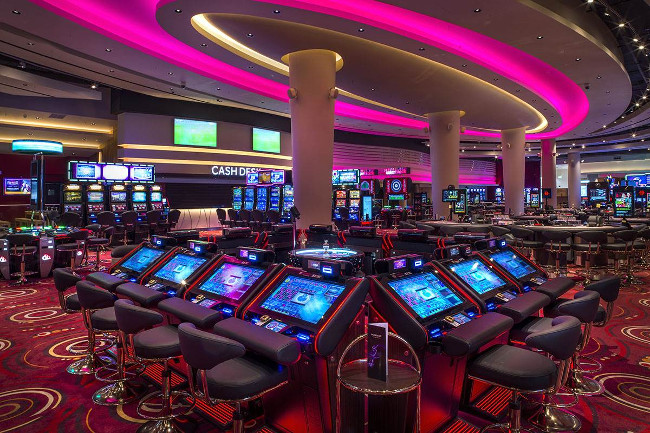
Such allure of casino games has enchanted huge numbers of people around the planet for ages. From the turning roulette wheel to the sound of dealing playing cards, the rush of chance and expertise blends to create an energetic environment that pulls players in. These activities are not just hobbies; they have become an integral part of the entertainment industry, growing into a worldwide movement that spans opulent getaways, dynamic online platforms, and everything in between. https://oke179.club
As the demand for one-of-a-kind and immersive adventures continues to expand, the narratives behind the success of gaming experiences reveal a captivating environment. Innovators and developers are always extending the frontiers of imagination and innovation, leading to the rise of fresh games and immersive technologies. Exploring these stories provides us insight into the requirements to build a gambling enterprise and the enthusiasm that drives those operating behind the scenes.
The Development of Gambling Games
Casino games have a vast history that dates back hundreds of years, with their origins often connected with historic rituals and social gatherings. The earliest types of betting can be traced back to long-ago Chinese civilization, where dice games were enjoyed, and even to the Romans who partook in betting on various occurrences. Over time, these rudimentary forms of entertainment evolved into more organized forms, resulting in the development of games like baccarat and roulette in the 17th century. These initial gambling games laid the basis for the industry we witness today.
As the world advanced, so did the complexity and variety of gambling options. The 19th century marked a significant turning point with the creation of official gambling establishments in locations like Monte Carlo and Las Vegas. This era saw the emergence of famous games such as poker and blackjack, which fascinated the interests of participants around the world. The surge of these games was fueled by advancements in game design and the implementation of betting regulations that rendered the industry more structured and attractive to the general populace.
The digital transformation in the final 20th and early 21st centuries altered the landscape of gambling options yet again. The advent of the internet led to virtual casinos, enabling users to enjoy their preferred games from the convenience of their homes. This transition not only broadened the scope of casino games but also opened up new types like live dealer games and mobile gaming apps. Today, the gambling game empire continues to progress, with innovative technologies such as virtual reality and blockchain expected to change the future of betting.
Successful Casino Game Creation Strategies
The basis of a successful casino game empire lies in the development of engaging and unique games that engage players. A winning strategy requires thorough market research to grasp current trends and player preferences. By evaluating user feedback and watching successful titles, developers can recognize what appeals with players and what features are in demand. Adding original themes, varied game mechanics, and aesthetically appealing graphics are vital to differentiate in a challenging landscape.
Collaboration is a further key factor of effective game development. Assembling talented designers, programmers, and mathematicians certifies that games are not only visually impressive but also balanced in terms of gameplay. Encouraging honest communication among team members promotes creativity and yields novel concepts. Moreover, interacting with players during the beta testing phase permits developers to gather insightful insights that can fine-tune gameplay elements before the official launch.
Lastly, efficient marketing strategies cannot be overlooked in building a successful casino game empire. Developing a persuasive narrative around the game and utilizing digital media platforms to create buzz can significantly impact player acquisition. Offering deals, loyalty rewards, and involving in community events can further enhance player retention. By blending strong development practices with savvy marketing, game developers can create an immersive experience that keeps players returning for additional.
A Future of Gambling Play
The landscape of gambling play is evolving quickly, driven by progress in technology and evolving consumer tastes. Digital and portable gaming is poised to dominate the industry as more players seek accessibility and access. Virtual VR and augmented reality are also entering into the gambling experience, providing engaging environments that elevate traditional gameplay to a different standard. As players crave more interactive and engaging experiences, casinos will need to adapt and innovate to keep their customers interested.
Additionally, the incorporation of artificial intelligence and data analytics will play a significant role in defining the future of gambling games. Casinos will utilize information to comprehend gambler behavior, personalize experiences, and boost client service. Personalization will become important, as players will want plays that modify to their tastes and gaming habits. As the gaming industry makes use of these understandings, the creation of novel game types and elements will likely emerge, keeping the gambling experience fresh and exciting for all.
Moreover, the trend towards safe gaming is becoming increasingly notable. As regulators and players focus more on gambler well-being, casinos will need to implement measures that promote responsible gaming practices. This could include features that allow players to set boundaries on their spending and time spent playing, as well as improved resources for those who may be dealing with gaming addiction. By prioritizing safe play, casinos can build trust with their clientele and ensure a sustainable future in the competitive landscape of gambling gaming.
